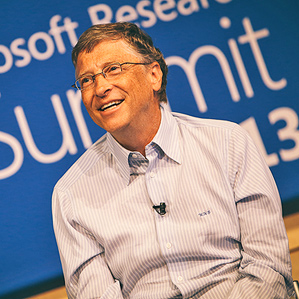Bill Gates: Software Assistants Could Help Solve Global Problems
Besides keeping us organized, software personal assistants could help fix some of the world’s most vexing problems, according to Microsoft cofounder and philanthropist Bill Gates, who spoke yesterday about developments in computing at an event held at the company’s headquarters in Redmond, Washington.

“We’re in a golden age of computer science” that’s finally making possible, after years of discussion by him and others in the industry, “that idea of the powerful assistant that can help us get things done that can give us deep insights,” Gates said.
Gates made the remarks at Microsoft’s annual Faculty Summit, a gathering of researchers from the company and universities.
Readily accessible floods of data, combined with powerful cloud computing and advances in software, should allow personal assistants to “understand” what humans are doing and actively collaborate or help them out, said Gates. Smart assistant software could even be crucial in addressing some of the world’s most challenging problems, he said, as identified by his philanthropic organization the Gates Foundation.
Gates said, for example, that software able to intelligently interpret the available data about a person and respond could improve education. The nonprofit Gates Foundation has been the “biggest funder” of the online education platforms known as massive open online courses, or MOOCs, he said. Gates noted that although effective, modern MOOCs are relatively straightforward technologically, suggesting that they could be made much more impactful through use of smarter software.
Assistant-style software could support learners not only in the virtual classroom, he said, but in other aspects of school or college experience that help people benefit from education. Software might help recommend suitable career paths and the credentials and courses needed to take them, for example.
Automatically nudging a student—tactfully, based on available data about them—when they didn’t attend class, or helping staff understand why a student may be skipping lessons could help the U.S. address its world-leading college-dropout rates, said Gates. Improving education is one of the Gates Foundation’s major areas of focus, and the only one that spans both the U.S. and the developing world.
Gates also said that combining mobile payment data with assistant software could allow the world’s poorest people to take better control of their finances. Microloan banks offer lines of credit to many unbanked poor, said Gates, but don’t help with saving, basic banking, or financial planning.
Gates imagined an assistant helping a Kenyan farmer using the M-Pesa mobile banking system that handles roughly 30 percent of the country’s GDP (see “Shopping via Text Message”). “When I sell my crop after the harvest, it advises me to save some of my money and even makes that deposit,” said Gates, who praised the data M-Pesa has made available for such projects. “We can instrument what’s going on in that currency in a way that isn’t possible in a conventional currency-based [system].”
Gates also said that assistant-style software could help office workers and others become much more productive. Today, most people make use of only a fraction of the capabilities of their computers, software, and the Web, he noted.
“As everybody gets essentially what we’ve called the personal agent—where we see where you’re going, we see your calendar, we see your communications—I think we’ll be more connected,” he said. Software could then correctly predict users’ needs and assist with tasks such as buying gifts or planning travel.
In a post-talk Q&A, Gates joked at his own expense about Microsoft’s history with personal assistant software, suggesting that a future personal assistant might take the form of a dog—a reference to the much-maligned Office Assistant feature, often known as Clippy, of earlier versions of Microsoft Office that guessed what a person was doing and offered to help. “It was a little bit premature, but I think it will reëmerge with a little bit more sophistication,” said Gates.
Keep Reading
Most Popular
Large language models can do jaw-dropping things. But nobody knows exactly why.
And that's a problem. Figuring it out is one of the biggest scientific puzzles of our time and a crucial step towards controlling more powerful future models.
How scientists traced a mysterious covid case back to six toilets
When wastewater surveillance turns into a hunt for a single infected individual, the ethics get tricky.
The problem with plug-in hybrids? Their drivers.
Plug-in hybrids are often sold as a transition to EVs, but new data from Europe shows we’re still underestimating the emissions they produce.
Google DeepMind’s new generative model makes Super Mario–like games from scratch
Genie learns how to control games by watching hours and hours of video. It could help train next-gen robots too.
Stay connected
Get the latest updates from
MIT Technology Review
Discover special offers, top stories, upcoming events, and more.